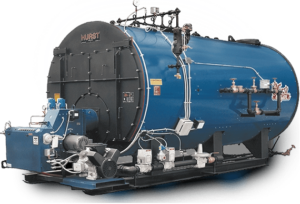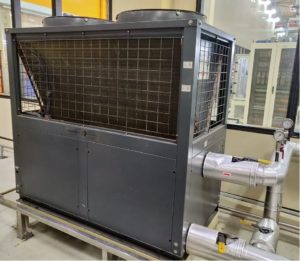With the rising popularity of heat pumps as a heat source in commercial heating space in India, the use of a heat pump system witnessed an increasing interest in industrial process heating as well. The most popular heating sources used currently in the industries and hotels are Boilers, Electrical Heaters, and Heat Pumps. Choosing one of these systems as a heat source to one of your processes will come down to characteristics of that process, existing heat source, factory head’s preferences and budget allowance.
Each heating system has its own pros and cons, but how do we decide which one is better than the others? Let’s compare the most used heating source – Boiler with the emerging star of sustainable heat source – the heat pump to see which device is going to win the “best heating device” title.
Let the fight begin between heat pump and boiler
 vs
vs 
Round 1 – Quick Startup
The boilers are known for its quicker startup of industrial processes. In comparison, the heat pump systems are poor at providing quicker startup. The boiler wins this round easily.
#Result: 0 – 1
Round 2 – Efficiency
The efficiency of any heating system is how much input energy supplied is converted into useful heat. Historically the boilers are considered 50-70% efficient. With the advent of recent technology, modern boilers have a much-improved efficiency of around 90%. Whereas the efficiency of a heat pump can reach as high as 350% depending on the liquid temperature to be maintained. So, the heat pump wins this round with a big margin.
#Result: 1 – 1
Round 3 – Floor Space
A typical air source heat pump is as compact as industrial chillers. When comparing air source heat pump with the conventional boilers, the heat pump requires less space. But if we compare ground source heat pump with the boilers, the boiler requires less space. Also, biomass boilers will take up more space than the standard boilers. The space requirement for both these systems depends on the system design and fuel to be used. This round end in a tie.
#Result: 1 – 1
Round 4 – Life Span
A typical gas fired boiler lasts around 8 – 10 years. While the typical lifespan of an air source heat pump is around 15 years. This round belongs to the heat pump and wins it with an additional 5 years lifespan.
#Result: 2 – 1
Round 5 – Regulatory Requirements
The boiler installation should comply with standard design and testing codes like Indian Boiler Regulations (IBR) for optimum system performance. The heat pump system design and installation codes requirement is minimal and complies with typical standard hot/cold water piping codes.
#Result: 3 – 1
Round 6 – Capital Cost
Despite being the efficient system, the capital cost for some heat pump systems is similar in price to boiler heating system. This round ends in a tie.
#Result: 3 – 1
Round 7 – Energy Cost
Like any refrigeration unit, the heat pump is operated by electrical energy. The electrical energy cost in India ranges from Rs.6 to 10 whereas the price of fuels used in industrial boiler ranges from Rs. 40 to Rs. 80. This shows that installing a heat pump system will give more than 50% cost benefit over boilers. The heat pump wins this round.
#Result: 4 – 1
Round 8 – Maintenance
Even with not having a routine maintenance check, the heat pump can help to preserve good efficiency and prolong life expectancy without profound consequences. The general heat pump maintenance is simple, and the cost associated is very low. Whereas, the boiler system is strongly advised to have all the maintenance check annually. The heat pump wins this round again.
#Result: 5 – 1
Round 9 – Environmental Impact
Modern boilers perform quite well when it comes to emissions and factor of environmental friendliness. On the other hand, Heat Pump doesn’t burn fossil fuels. But they do rely on electricity to power their functions, their extreme energy efficiency basically guarantees that even in the case that the electricity is generated from a coal-powered station, carbon emission to the environment would be minimal. Given that electricity is now being generated through more renewable methods such as solar and wind power, even this negligible contribution is likely to reduce in the near future. The heat pump wins this round again.
#Result: 6 – 1
The fight is over!! The heat pump wins the title from the long-reigning champion – the boiler. If you want to move forward with a sustainable heating solution, be environment-friendly and using fossil fuels for the heat source, then the heat pump system is your winner.

Heat pump are environment friendly .no requirement of fossil fuel .
No pollution which is a heart concern at present.
No noise.
Easy to operate
I am looking for the heat pump dryer for agriculture purposes
Heat pumps can win upto 60deg cent. Beyond that upto 120deg cent boiler wins. HP maintenance is more expendive c
GOOD READ
Yes now everyone is understanding importance of heat pump.
I work in LPG sector and I differ on point 2 and 7.
Point 2- No heating equipment can have an efficiency above 100%. LPG heat transfer efficiency is between 93-97%. For electric heating device, it’s more than 99%.
Point 7 – The conclusion is not correct. 1 unit of electricity is 860 kcal (Rs. 8-10). 1 kg of LPG has 11800kcal (Rs. 45-55). Without doing calculations, the conclusion is baseless.
If you do the calculations right, LPG heaters gives minimum 30-40% cost saving compared to electricity.
Good informative blog. Thank you for sharing your experience. Visit Used Boilers
I want heat pump for my home
Thanks for showing interest in our product.